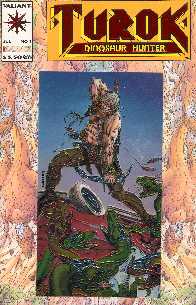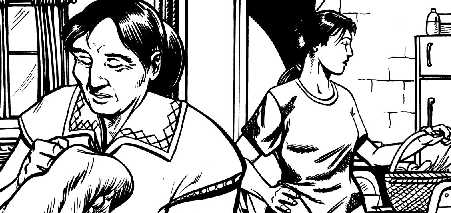Home |
Contents |
Photos |
News |
Reviews |
Store |
Forum |
ICI |
Educators |
Fans |
Contests |
Help |
FAQ |
Info


Culture and Comics Need Multicultural Perspective 2000
(8/24/00)

Tall Oak, a Narragansett quoted in the documentary 500 Nations, calls Indians the conscience of America. "The lesson," he says, "is to realize the value of an alternative perspective. And that is why we are here. That is why the Creator allowed some of us to remain, in spite of all the attempts to destroy us."
*****
With violence headlining the news around the globe, a multicultural perspective has never been more relevant than now. No longer does "rugged individualism" or "might makes right" seem the answer to every dilemma. Even jaded Americans, sure of their own superiority, are beginning to ask what's happening.
Unfortunately, the frontier mentality is embedded deeply in the American psyche. It's pervasive in every form of popular entertainment, from sports to TV to comic books. How many times has the lone hero, a James Bond or Luke Skywalker, defeated the forces of evil against insurmountable odds?
By providing another perspective, multicultural products challenge our predominant myths. But it's difficult to find such voices in today's media onslaught. Few minority creators have the resources to break through the noise.
As the smallest and most at-risk minority, Native Americans provide a case study of how mainstream society ignores other viewpoints. As an indigenous people with non-Western roots, they also suggest an antidote to our monocultural beliefs.
The root of the problem
The difference between the Western and Native mindset is deep-seated. One could say it extends all the way back to the origin. A quote from the Time-Life Book The Spirit World (American Indians) explains the two approaches:
In contrast to the biblical book of Genesis, in which God creates man in his own image and gives him dominion over all other creatures, the Native American legends reflect the view that human beings are no more important than any other thing, whether alive or inanimate. In the eye of the Creator, they believe, man and woman, plant and animal, water and stone, are all equal, and they share the earth as partners—even as family.
Recurring themes include the idea of Mother Earth as life host, the relationship of reciprocity that exists between human beings and animals, and the Indians' dependence on animals as teachers. The plots are often complex, take numerous twists and turns, and commonly include humor. But any comic elements never detract from the story's sacred purpose.
The Western mindset developed over the centuries. Aristotle claimed superior humans, such as the rational Greeks, should rule over their cultural inferiors. A papal bull delivered May 4, 1493, expressed the desire that "barbarous nations be subjugated and brought to the faith itself." It was a short step from there to the enslavement of Africans, the decimation of Indians, and the extermination of Jews.
Ancient history? One might dismiss these as outmoded mistakes, but the attitudes are still evident in our everyday media. They reflect a mindset we rarely even notice, much less question.

Racism here and now
Most people consider blatant racism a thing of the past. But as the 21st century dawns, minority stereotyping and slighting still occur too often. A few recent examples:
- Valiant's 1993 TUROK comic featured a half-naked Native warrior who uttered such unsavory cliches as
"shaman" and "squaw." Other comic-book fighting machines include Tim Truman's Scout, Marvel's Thunderbird and Warpath, and DC's Butcher.
- The 8/31/99 B.C. comic strip depicted a Native American speaking crude English, discussing wampum, and standing before a tipi—a erroneous mixture of stereotypes. Later, the Native indicated he learned to speak from books on Tarzan, Tonto, and Frankenstein.
- The 1998 direct-to-video Pocahontas II falsified history to show the English and Indians working together to achieve lasting peace. The 2000 release The Road to El Dorado presented a host of indigenous cliches: the fat chief, the evil priest, the scantily-clad temptress.
- FANTASTIC FOUR #29 (published March 2000) portrayed Wyatt Wingfoot's tribe hiding its advanced technology behind a culturally incorrect facade of pueblos and wickiups. The message was that other Indian tribes are impoverished losers and even the Keewazi must fear the white man.
Comics mirror society
American comic books and cartoons are a leading influence on today's pop culture. As a recent Wall Street Journal article said, "Comic books...remain a rich source of movie scripts and video-game material." One could cite everything from Batman to the Teenage Mutant Ninja Turtles to Pokémon as examples.
Native Americans have made strides in comic books. A dozen or two significant characters exist. But few of them are leaders or stars. No Native American—indeed, no minority superhero except the Black Panther (a holdover from the '60s)—is on the title of a DC or Marvel comic.
How does the prevailing attitude express itself in comics, and what's the alternative? Consider the following:
Comic book characters are routinely tall and thin, and often fair-haired and fair-skinned, like golden idols. In contrast, Native Americans tend to be genetically programmed to be short and stocky, with dark hair and skin.
Comic book heroes routinely rush into battle without calling for help—either from other heroes or the authorities. In contrast, Native Americans tend to stress community involvement over glory-seeking individualism.
If our heroes pause to talk, they demand answers or specify solutions. In contrast, Native Americans tend to approach problems indirectly. They tell stories and let listeners realize the best course of action for themselves.

Often a superhero conflict becomes a contest of wills, a competition for its own sake, as the underlying goals are forgotten. In contrast, Native Americans tend to shun adversarial relations and seek the inclusion of all.
Comic book villains are routinely captured and put behind bars without any attempt to rehabilitate them. In contrast, Native Americans tend to emphasize methods such as "talking circles" so wrongdoers can face up to their deeds.
Conclusion
People around the world see Americans as having a cowboy mentality. Ours is "a culture that confirms the stereotype of the individual as solitary gunslinger and society as a hostile frontier," as one LA Times article phrased it. To put it colloquially, we shoot first and ask questions later.
So what's the answer? Whether we're talking about John Wayne, the Punisher, or ourselves, the answer to our cultural myopia is a multicultural perspective.
Other postings of "Culture and Comics Need Multicultural Perspective 2000"
Canku Ota (9/9/00)—Vicki Lockard, editor
More evidence of Rob's thesis
Hercules vs. Coyote: Native and Euro-American beliefs
A shining city on a hill: what Americans believe
Multiculturalism defined
Comic books influence culture
Related links
Culture and Comics Need Multicultural Perspective (original version, with responses)
Why write about Native Americans?
The future of comics
News from a multicultural perspective
America's cultural mindset
* More opinions *
|
|
. . .
|

|
Home |
Contents |
Photos |
News |
Reviews |
Store |
Forum |
ICI |
Educators |
Fans |
Contests |
Help |
FAQ |
Info
All material © copyright its original owners, except where noted.
Original text and pictures © copyright 2007 by Robert Schmidt.
Copyrighted material is posted under the Fair Use provision of the Copyright Act,
which allows copying for nonprofit educational uses including criticism and commentary.
Comments sent to the publisher become the property of Blue Corn Comics
and may be used in other postings without permission.



